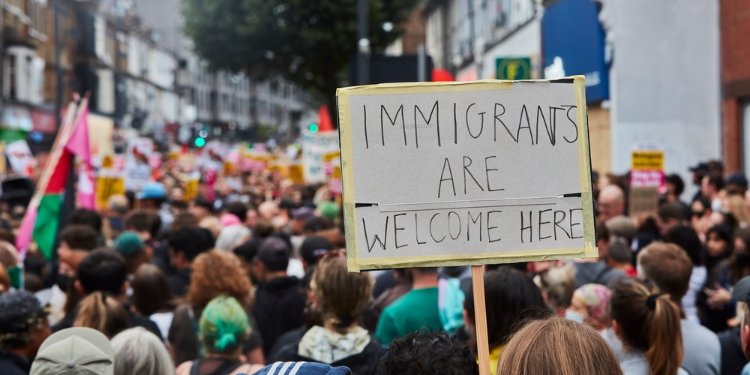
In late July, far-right and anti-immigrant riots erupted across the UK following the spread of fake news claiming that an asylum seeker was responsible for a mass stabbing incident. Far-right mobs started attacking people of color and those they suspected of being immigrants. While arrests were quickly made in response to the violence, many expats and even British people of color remain shaken by the riots.
Fake news, racism and Islamophobia have driven these riots
The last time the UK experienced riots was over a decade ago. In 2011, riots broke out in major cities like London, Birmingham and Liverpool after a young man was killed by the police. Five people died, over 200 were injured, and property was looted and destroyed. The police arrested over 3000 rioters, and many were jailed even for petty thefts.
This time around, the riots are not exactly the same. For one, this time, the riots happened in the era of digital disinformation. On July 29, a British teenage boy attacked a children's party in Southport (close to Liverpool) and murdered three girls. Even if the police had not released any information about the attacker's identity yet, fake news started circulating online that he was a Muslim refugee who had recently arrived in the UK on a small board. This fake news was first posted on X (formerly Twitter). It was then picked up by an obscure and unreliable news website, which made it go viral and fueled far-right mobs to riot in the streets.
Another critical difference between these riots and those in 2011 is the significant involvement of organized far-right groups. In the 2011 riots, organized gangs played a minor role. However, the 2024 riots are believed to have been largely orchestrated by the far-right group English Defense League (EDL). Formed in 2009 as a nationalist organization, the EDL is openly Islamophobic. While it has not officially labeled itself as a white supremacist group, it has been linked to neo-Nazi organizations and hate crimes against people of color, whether Muslim or non-Muslim. The EDL's nativist ideology drives its strong opposition to immigration and expatriation to the UK.
People of color and Muslims were targeted, especially in northern England
The far-right rioters specifically targeted people of color and Muslims, with immigrants, expats, and asylum seekers being particularly vulnerable. Numerous news reports have documented these horrific attacks. In a Manchester public park, a Black man was beaten by a mob until the police intervened. Multiple hijabi or veiled Muslim women have reported being spat on, having their headscarves torn off, and being subjected to insults. A Muslim man was stabbed while waiting for the train in Liverpool.
In places like Hull and Middlesbrough, far-right thugs stopped cars to check if the drivers were white. Drivers of color were either blocked from passing or forcibly removed from their vehicles and beaten. One Nigerian international student in Middlesbrough returned from his part-time job as a carer to find his car set ablaze. In Belfast, the capital of Northern Ireland, small businesses owned by Muslim immigrants, such as cafés, were set on fire. Hotels housing asylum seekers were also set on fire, and mosques have been attacked. Immigration lawyers' offices and homes have also been threatened with attacks.
The riots have mainly affected Northern Ireland and the northern part of England. Scotland and Wales have remained riot-free, while cities in the south of England, including London, have only witnessed smaller-scale riots. The North has faced much higher levels of poverty since the 1980s, which has led to growing frustration and the scapegoating of immigrants. London is relatively safer from far-right violence because it is highly multicultural and has a very large expat population.
Travel advisories for the UK and fear among expats
Multiple countries issued travel warnings for the UK as the riots unfolded. Malaysia, Indonesia, the UAE, Nigeria, Kenya, India, Australia, and Sweden have all urged their citizens to steer clear of large crowds and areas affected by the unrest in the UK. Britain has a very large Indian and Nigerian expat population. Moreover, many of the countries that have issued warnings have large Muslim populations, which makes their citizens living in the UK more at risk.
A Nigerian expat we interviewed expressed relief at living in Reading, a town close to London that has largely been spared by the riots. She wishes rent were more affordable in London and surrounding towns, especially for younger expats like herself, so that she can continue staying in this region where she feels safe as a woman of color and immigrant. She knows that she could afford to rent a better house further up north, but she would rather put up with less comfortable housing than live in an area where the far-right is a real threat.
Another expat we interviewed shared her fear of being a visibly brown and veiled Muslim woman. The travel advisories have made her question whether it's wise for her family to visit her in the UK this summer. If they do come, she plans to pick them up from the airport by taxi instead of letting them travel alone so they can all feel safer. At the moment, she is also avoiding going out late at night.
Many people had to cancel and schedule travel plans around the country. A British student shared with us how she had to cancel plans to take her university friends, who are international students, on a daytrip to the seaside resort Clacton-on-Sea. The reason is that it is a constituency of the far-right Reform Party. She explained that it felt unsettling to realize that her international friends from Africa could be at risk because of their skin color during the weeks of the riots, while her white friends from the US and Spain, who are also international students in the UK, would be less affected. Her friends were also relieved to cancel the trip.
Some employers have been particularly mindful of the risks that employees of color may encounter when commuting to the office during the riots. According to the HR magazine People Management, some companies have allowed at-risk workers to adjust their start or finish times, work from home, or be accompanied by a colleague when leaving the office in the evening to ensure their safety.
Rapid legal action and displays of anti-racist solidarity have provided reassurance
Despite how scary the situation has been, the UK government's prompt response has provided some reassurance. Strong displays of anti-fascist, anti-racist solidarity from civil society have also offered comfort.
In just over a week, over 700 rioters have been arrested, with over 300 already sentenced. Courts are operating 24 hours a day to speed up the process. While livestreams of court proceedings are uncommon in the UK, the sentencing of rioters at the Liverpool Crown Court has been broadcast live under these extraordinary circumstances to discourage further unrest. The government has warned that rioters could face up to 10 years in jail.
Inciting racial hatred online is also being taken seriously. The wife of a local councilor was arrested for tweeting in support of burning hotels housing asylum seekers; she now faces up to 1.5 years in jail. A second woman, suspected of having written the fake news tweet that sparked the riots, has also been arrested from her home. Police intelligence researchers are combing through social media platforms to identify those promoting far-right violence from behind their screens. Some individuals have been arrested for posting memes about killing immigrants.
Civil society has rallied to show solidarity with immigrants, people of color, and Muslims. Concerns about further far-right riots in multiple cities dissipated as anti-fascist counter-demonstrations drew larger crowds. Immigrants and international students whose property was damaged have received widespread support, including financial assistance. For instance, crowdfunding campaigns were launched to raise money for rebuilding the small Muslim-owned businesses that were burned down in Belfast, and the Nigerian student whose car was burned has been gifted a new vehicle by his employer. These actions should reassure expats in the UK that they are welcomed by a large part of the British population and that they will receive both government and civil support in the face of violent xenophobia.
When interviewed, a Mauritian expat in Birmingham shared how he reacted to rumors of a far-right riot in the city. Overcome with panic, he decided to cancel his plans for after-work drinks with colleagues and stay at home instead. Later that night, as he checked social media from the safety of his home, his fear subsided when he saw that the far-right had finally not shown up. He felt moved to see that, instead, a large anti-fascist crowd had gathered peacefully on the street which the far-right was rumored to have targeted.



















